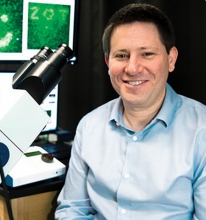BME Lecture Series (Zoom): Elliot Botvinick, UC Irvine

Abstract: Matrix stiffness is a well-established instructive cue in two-dimensional cell cultures. Understanding roles for stiffness during processes such as morphogenesis, and the complementary effects cells have on the mechanical properties of their surrounding, is a major challenge. In our study, we apply traditional bulk rheology and optical tweezers-based active microrheology to probe mechanical properties across length scales during the complex multicellular process of capillary morphogenesis in 3D. We further characterize the relative contributions of neovessels and supportive stromal cells to dynamic changes in stiffness over time. Our data show local ECM stiffness was quite heterogeneous around sprouting capillaries, and the variation progressively increased with time. Both endothelial cells and stromal cells progressively stiffened the ECM, with the changes in bulk properties dominated by the latter. Interestingly, regions with elevated stiffness values did not necessarily correlate with remodeled regions of high ECM density as shown by confocal reflectance microscopy. The large spatiotemporal variations in local stiffness underscore how characterizing ECM mechanics across length scales is imperative. Such characterization provides an opportunity to obtain a deeper mechanobiological understanding of the microenvironment's roles in cell fate and tissue patterning. I will also briefly discuss some thoughts related to fibrous networks. These ideas are inspired by my doctoral students’ current work and born from the stay-at-home order.
Bio: Elliot Botvinick is a professor of biomedical engineering and surgery at UC Irvine. His research program has two areas of focus, one in mechanobiology and the other in medical device development. His laboratory develops state-of-the-art instrumentation and devices for quantitative biophysical measurements toward the study of mechanobiology. These tools are applied to test mechanical hypotheses in the areas of cancer biology, microvascular morphogenesis, tissue engineering and stem cell biology. The Botvinick laboratory is currently working to: (1) develop sensors of additional signals for the artificial pancreas, including a continuous insulin monitor (in collaboration with Gregory Weiss, UCI), and (2) develop and test a new material to extend the lifetime of insulin infusion sets (in collaboration with Ali Mohraz, UCI). Currently his laboratory technologies are involved in three clinical studies of three different technologies.
Share
Upcoming Events
-
EECS 294 Seminar: Programming Light Diffraction for Information Processing and Computational Imaging
-
MAE 298 SEMINAR: Stretchable Electronics for Soft Biological and Robotic Systems
-
CBE Distinguished Lecture/CBE 298 Seminar: Computational Design of Peptides as Detectors, Sensors and Drugs
-
MSE 298 Seminar: Molecular Modeling in the Age of AI - From Energy Materials to Device Simulations
-
CBE 298 Seminar: Metal Electrodeposition for Modern Mineral Refining
